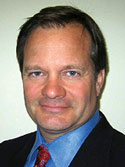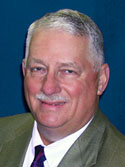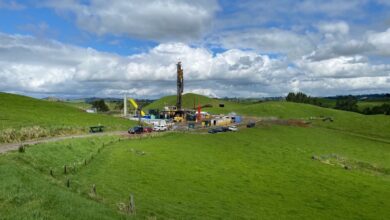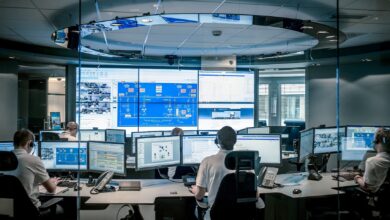How do you view technology? Are you a ‘Why?’ or a ‘Why not?’
“Some men see t hings as they are and ask why? I dream things that never were and ask why not?” Citing this JFK quote during his presentation during the opening-day plenary session at the 2010 IADC/SPE Drilling Conference in New Orleans, panelist Helge Hove Haldorsen of Statoil urged the industry to adopt more of this of the “Why not?” attitude when it comes to technology.
hings as they are and ask why? I dream things that never were and ask why not?” Citing this JFK quote during his presentation during the opening-day plenary session at the 2010 IADC/SPE Drilling Conference in New Orleans, panelist Helge Hove Haldorsen of Statoil urged the industry to adopt more of this of the “Why not?” attitude when it comes to technology.
When new technology fails or doesn’t deliver as expected, it will depend on that “Why not?” attitude to carry it forward until it does succeed or get proven. As the industry faces increasing challenges to meet the energy demands of the 6.7 billion people on Earth, the industry will need “even more of the Kennedy-esque approach to challenges,” he said.
Look at the deepwater Gulf of Mexico, where two-thirds of the acreage are covered by salt and a 30,000-ft subsalt well can cost $250 million to drill and complete. If the industry wants to tap these significant Lower Tertiary resources, then advances in seismic imaging will be critical. A success rate of one in three or four is simply not good enough, he said.
And is it crazy to ask for a multifractured, multilateral well in the deepwater Gulf that is fractured every 500 ft like in onshore shale gas wells? Perhaps, but that doesn’t mean operators won’t and shouldn’t keep asking for it. In the future, Mr Haldorsen continued, the industry “will need more competence and more brains per barrel.”
Automation is another major enabling technology for the industry, yet their adoption has been largely limited to high-end rigs so far. In order for automation technologies to bring real value to the industry, they must move beyond high-end rigs, said panelist Fred Florence of National Oilwell Varco.
“How do we deploy these (technologies) on some rigs? Not all rigs but … the ones that make sense? The difficult part sometimes is we have to persuade people why it makes sense. ‘Never needed it before, so why do I need it now?’ is often a barrier to our business,” he said.
“But when we overcome this, it sets the stage for breakthrough technologies.”
Mr Florence also noted that it’s only natural for people to view technology differently depending on individual their experiences and needs. “If your job is to control capital expense, you’ll look at the cost of these machines. If you are an operations role, you see the horrible cost impact of downtime. … But the real visionaries will see value creation. They’re going to see this cost as an investment, and those are the people that will lead this technology into a breakthrough situation.”
Looking to the future, Mr Florence emphasized the emergence of offline models that will help drill difficult wells, or even currently impossible wells. “Today we have models that run, and somebody picks up the phone and tells the driller what to do. What’s going to happen is these models will be tied into the controls of the rig. There will be more than one model running simultaneously, and the models will come from different people.”
He continued: “Like the old electronic driller that’s handling three or four parameters at one time, these new machines will be handling three of four different sets of commands at one time. … What we’re going to change is not the technology on the drill floor, but how the technology on the drill floor affects the wellbore.”

The third panelist, BP’s Scott Sigurdson, described some of the changes his company is making to ensure that the next generation will be ready to take over when the older generation retires. The urgency of that challenge was obvious.
“As you saw in the chart earlier, we are demographically challenged. The big crew change is here,” he said. Mr Sigurdson was referring to a poll earlier in the session revealing that 60% of the participants in that room had more than 20 years of experience in the industry. The survey also showed that only 7% had five to 10 years of experience while 17% had fewer than five years.
At the same time as this crew change, well complexity is increasing and the industry is facing “more and more engineering challenges that we haven’t seen before,” he said.
BP recognized these challenges on the horizon, and “we knew we had to make a change … We needed to develop deeper technical expertise.” After all, technology is only as good as the people who apply it, he said.
Whereas the company used to provide its employees a wide range of training and development courses to choose from, now the company wants to make sure there’s a process in place to help employees take the right courses at the right time. A mandatory road map is being developed to guide employees on the training and competencies they need before advancing to specific positions.
“I think, without a doubt, we need to continue to focus on growing competency across the industry. This is going to take a concerted effort from operators, contractors and service companies,” Mr Sigurdson pointed out.
“I think we need to focus on growing engineering fundamentals and growing specialists. That appears to be something we’ve been missing in our organization for a few years, but I believe it’s coming back.”
For the final panelist of the session, his message when it comes to new technology is simple: More is not always better.

Mark Childers, a consultant with more than 40 years of experience in the drilling industry, advocated the concept of “KISS” for new technologies – “Keep It Simple, Stupid.”
“How do we improve technology but make it more manageable at the rig level?” he asked.
Mr Childers cited three areas of concern in this regard, the first being “exotic and complex electronics for almost everything on the rig.”
“Is it really necessary?” he asked, adding that there’s a tremendous cost associated with keeping specialists on rig to maintain electronics-controlled equipment.
The other two were MUX systems and tubular pipe-handling systems, which he sees as areas of concern that lead to downtime. There is still a gap in efficiency that has to be addressed, he said.
“I do not mean to imply that new technology is bad,” he clarified. “That is the farthest from what I’m trying to say. I just want to throw out some ideas to make new technology more adaptable to the field. … I want to point out that maybe we need to be more alert at keeping things simple and efficient, as well as safe.”
The session was moderated by Mark Mitchell of Weatherford International.




